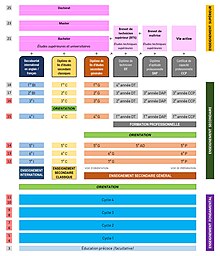The U.S. Division of Schooling is considering a new regulation that might tie a faculty’s skill to supply federal grants and school loans to proof that its alumni can discover gainful employment after graduation.
Faculties and universities that can't exhibit that their graduates are "gainfully" employable -- earning sufficient after commencement to be able to make the month-to-month payments on their student loans -- can be barred from offering federal monetary help.
Although the proposed regulation -- the so-called "gainful employment rule" -- would apply to all faculties that supply federal financial help, the rule is aimed specifically at curbing complaints about for-profit schools that present occupational schooling and job training at such high costs that their graduates are often left in monetary sinkholes, overburdened with student loan debt and holding levels that may not translate into something but minimal-paying jobs.
The Division of Training had planned to release the revised draft wording on the gainful employment rule in November, but needed to spend additional time reviewing the more than ninety,000 public comments made when the rule was first proposed in July. The government hopes to implement the rule by July 1, 2012.
>> Regulators: ‘Gainful Employment’ = Capacity to Repay Scholar Loans
As outlined by the Schooling Division within the initial draft of the rule, "gainful employment" will be measured in part by the share of a faculty’s graduates whose scholar loans are in default.
The Education Division already presently considers scholar mortgage default rates as a situation for allowing establishments to supply federal financial assist, however the brand new rule would allow the federal government to judge colleges program by program, utilizing student mortgage default rates particular to every diploma program supplied, relatively than the varsity’s overall default fee.
Some critics of the proposed regulation query the deserves of utilizing pupil loan defaults as a measure of gainful employment, as opposed to measuring employment more immediately by way of different means. These critics level out that borrowers could default on their pupil loans for reasons apart from unemployment or low earnings, and a few colleges worry that they’ll be held answerable for defaults that are unrelated to employment.
Client watchdogs and pupil advocacy groups, nonetheless, maintain that for-revenue faculties encourage college students to take on more pupil loan debt than they'll reasonably afford, to be able to pay the excessive price tag that for-profit colleges slap onto diploma packages with restricted or low-paying employment prospects.
Additional, these groups says for-profit faculties may be enrolling students who aren't academically qualified for the programs they enter, creating a higher chance that these students will drop out of their program, which in turn means a higher chance that these scholar will default on their scholar loans. (Faculty dropouts, on the whole, default on their scholar loans at a better fee than do those students who full their diploma.)

Post a Comment